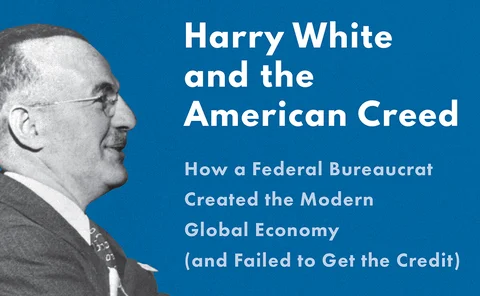John Maynard Keynes
Escaping the structural liquidity trap
Investment needs to be subsidised not taxed if developed countries want to avoid inflation and financial crises, writes Andrew Smithers
The case for restoring the role of monetary aggregates
Tim Congdon argues that a surge in money supply in response to Covid-19 sparked heightened inflation and central banks need to refocus their attention on monetary aggregates
Book notes: Harry White and the American creed, by James Boughton
This book offers a deeper understanding of the hugely influential IMF founder and his work, but fails to resolve espionage charges
Lifetime achievement: Stanley Fischer
Fischer has had a profound impact on monetary economics and central banking during his prolific career
Book notes: Robert Triffin, by Ivo Maes with Ilaria Pasotti
Triffin’s story is well told by Maes, whose extensive personal and academic research shines through on page after page
‘Unstable, unreliable and temporary’: paper explores global co-operation
Policy-makers should heed JM Keynes’ 1919 warning, say Michael Bordo and Catherine Schenk
Book notes: Economic philosophies, by Alessandro Roselli
Roselli’s analytical and historical exploration is especially valuable now, writes Robert Pringle
Otmar Issing on the art of central bank communications
EMU architect speaks about Draghi’s “whatever it takes” intervention, forward guidance failures, the Fed’s average inflation target ‘miscommunication’, and why the ECB may be overreaching in its strategy review
Olli Rehn on AIT, market neutrality and EU fiscal policies
The Bank of Finland governor talks about the ECB’s strategy review, market failure on climate change, lessons from the sovereign debt crisis, and the Draghi legacy effect on Covid-19 responses
A fiscal alternative to stabilise the post-Covid economy
Columbia professor Michael Woodford calls on policy-makers to think beyond interest rates
Tackling ‘dead-end’ monetary policy
A shift to lower inflation targets would help central banks escape forever-loose monetary policy, writes former IMF chief Jacques de Larosière
A dangerous unknown: interest rate risk in the financial system
Urgent action is needed to tackle the little-understood build-up of interest rate risk in the global financial system; macro-pru tools still inadequate to tackle the issue
Book notes: The Limits of the Market, by Paul de Grauwe
De Grauwe has produced a concise analysis into how markets and governments react with one another; but his lack of familiarity with the history of economic thought is surprising
Book notes: Can We Avoid Another Financial Crisis?, by Steve Keen
Steve Keen challenges “mainstream” economic thinking in this concise book, hoping to shift the political debate on debt
Yield curve control has long history – BoJ’s Amamiya
BoJ’s policy of controlling long-run rates is not as unconventional as many critics argue, executive director says
Book notes: The power of a single number, by Philipp Lepenies
Lepenies offers a brief but very readable treatment of GDP's political history, drawing out some important lessons in the process
Norges Bank deputy pits Keynes against Hayek
Jon Nicolaisen says European countries may have invoked the lessons of Keynes without paying heed to the warnings of Hayek – both views are needed to avoid problems
The Bretton Woods transcripts: debate about the World Bank and the BIS
Andrew Rosenberg highlights the secondary importance of negotiations to create the World Bank and cover ‘other discussions’ as well as Norway’s objections to having the BIS once the IMF was founded
Bretton Woods transcripts reveal global discord that still resonates today
In the first of three articles, Andrew Rosenberg discusses the issues that arose at the 1944 conference that continue to echo down through the years.
Book notes: Lionel Robbins
A biography of a 20th century British economist
Managing the World Economy
ARTICLE - An Article by Kenneth Rogoff, Economic Counsellor and Director of the Research Department, International Monetary Fund, The Economist.






















